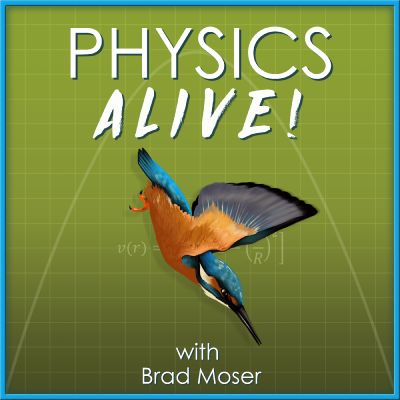Physics Alive is the podcast where host, Brad Moser, Ph.D., sparks new life into the physics classroom. Each episode supports and shares the many forward-thinking developments that have come from physics education research and inspiring educators. Brad speaks with teachers who employ innovative and active learning styles, researchers on the frontiers of physics education, catalysts for change on important social issues in the STEM community, and students who want the most out of their education.
https://physicsalive.com
episode 12: Let's Code Physics with W. Brian Lane
Have you ever wanted to bring coding into your classroom? Or maybe you’ve introduced some computation, but you want to move to the next level? Let’s go code some physics! In this episode I talk with W. Brian Lane, the creator of the YouTube channel Let’s Code Physics. We talk about his videos, the online coding platforms he recommends, and how to get started coding in the classroom. We also talk about the workshops and exercise sets available through the PICUP community, and then branch into a different topic: replacing lab reports by asking students to write a letter home.
Check out the YouTube channel Let’s Code Physics. A few video series include:
- A Journey through Modern Physics
- VPython for Beginners
- Coding for High School Physics
- Computational Problems for Intro Physics
- Euler-Cromer for Beginners
- Tracker for Beginners
Online coding platforms
- Glowscript
- p5.js
PICUP – Partnership for Integration of Computation in Undergraduate Physics
- Learn more at Compadre.org/PICUP
Resources on the website
- Schedule of events: webinars, workshops, recordings
- Collection of peer-reviewed exercise sets
- Ready for classroom use, with starter code and lead-in code
- PICUP Slack channel. People post on this multiple times a week with questions and answers
How can I build more confidence in my ability to teaching coding in physics?
- Start with an existing code. Don’t start with a blank program.
- Play with the code like it was a lab experiment. Know how “the equipment” works.
- Think about your goals for incorporating computation in the class. What are you hoping to accomplish?
- Scaffolding process
- You and students start by reading code.
- Then learn to use code.
- Then modify code.
- Then add code.
- This guides you toward the end goal of being able to write code from scratch.
And now for something completely different:
- Article: Letters home as an alternative to lab reports
- or here
